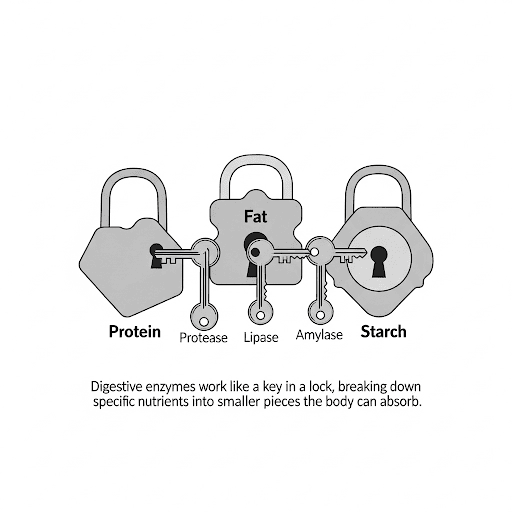The journey of a single piece of kibble is remarkable. Your pet chews it, swallows it, and then the true magic begins: the transformation of that solid morsel into the usable energy and nutrients that fuel their life. This process isn't magic at all, but a precise biological symphony conducted by an army of invisible but incredibly powerful workers called enzymes.
Understanding the role of enzymes in pet digestion is key to understanding your pet's overall health. This article will explain what these powerful catalysts are, how they work to unlock the nutrition in your pet's food, and address the common question: does my healthy pet really need extra enzymes in their diet?
The "Lock and Key" Model: How Do Enzymes Work?
To understand how do enzymes work, it’s best to think of them as tiny, highly specialized keys. An enzyme is a type of protein that acts as a biological catalyst, dramatically speeding up a specific chemical reaction without being changed itself.
The "Lock and Key" model is the easiest way to visualize this:
- The Lock: This is a large nutrient molecule in your pet's food, like a complex protein, fat, or starch molecule.
- The Key: This is the digestive enzyme. It has a unique, specific shape that perfectly matches its target "lock."
An enzyme key for protein will not fit a fat or starch lock. When the correct enzyme key finds its matching nutrient lock, it binds to it and "unlocks" it, breaking the large molecule down into smaller, simpler pieces that are tiny enough to be absorbed through the intestinal wall and into the bloodstream. After the job is done, the enzyme key is released, ready to find and unlock the next matching molecule.
The Three Musketeers of Digestion
While there are many enzymes in the body, digestion relies on three main classes, which are produced primarily by your pet's pancreas. These pancreatic enzymes for pets are the workhorses of the digestive system.
- Proteases: These enzymes are responsible for breaking down protein into its individual building blocks, amino acids.
- Lipases: This group targets lipids (fats), breaking them down into smaller fatty acids and glycerol.
- Amylases: This class of enzymes breaks down amylose (starches and carbohydrates) into simple sugars like glucose.
In a healthy dog or cat, the pancreas is an incredibly efficient factory, producing and releasing the perfect amount of these three enzyme types every time your pet eats.
The digestibility of a food is paramount. A diet made with high-quality, easily broken-down ingredients puts less stress on your pet's digestive system. Our meal planner app prioritizes formulas made with highly digestible proteins and fats, ensuring your pet's natural enzymes can work efficiently to unlock the maximum nutrition from every meal.
Do Healthy Pets Need Extra Enzymes? The Great Debate.
You have likely seen pet products advertising "added digestive enzymes" with claims of improved digestion and nutrient absorption. This leads to a critical question: are these digestive enzymes for dogs and cats a necessary supplement?
For the vast majority of healthy pets, the answer from the veterinary community is no. A healthy pancreas is more than capable of producing all the enzymes required to digest a high-quality, complete and balanced diet. There is currently no scientific evidence to support the routine use of enzyme supplements for healthy pets.
The major exception is a specific medical condition called Exocrine Pancreatic Insufficiency (EPI). This is a serious disease where the pancreas fails to produce enough—or any—digestive enzymes. A pet with EPI cannot digest their food and will suffer from ravenous hunger, severe diarrhea, and dramatic weight loss. For these pets, adding a prescription-strength pancreatic enzyme powder to every single meal is not just beneficial, it is essential for their survival. EPI must be diagnosed by a veterinarian through specific blood tests.
(EPI is a serious condition that requires veterinary diagnosis and management. Learn more in our article [Feeding a Pet with Exocrine Pancreatic Insufficiency (EPI)].)

Conclusion: Trusting Your Pet's Natural Digestive Power
Digestive enzymes are the essential catalysts that turn food into life. The three main types—protease, lipase, and amylase—work in perfect harmony to unlock the proteins, fats, and carbohydrates in your pet's diet, and a healthy pet's pancreas is a master at producing them.
While marketing for supplements can be compelling, the best way to support your pet's digestion is not by adding unnecessary extras, but by providing a foundation of high-quality, highly digestible food. This makes the job easier for your pet's own powerful enzyme factory.
If you have concerns about your pet's digestion, such as chronic gas, bloating, or abnormal stools, the first step is always a conversation with your veterinarian to rule out any underlying medical issues. Use our meal planner to choose a diet with proven digestibility, and trust in your pet's amazing, built-in digestive power.


